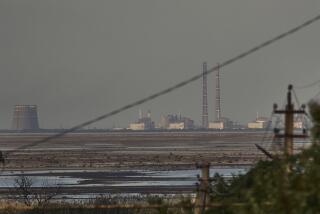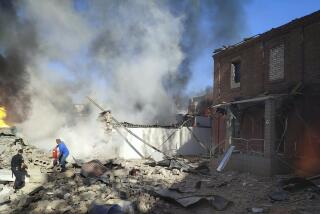Soviets Probably Restarted Nuclear Reactors Without Promised Repairs, U.S. Official Says
- Share via
WASHINGTON — The Soviet Union most likely has resumed operation of some nuclear plants without making the safety improvements promised in the wake of the Chernobyl accident, Energy Secretary John S. Herrington said Tuesday.
“Our best estimate is they started Chernobyl up probably too soon to do all the upgrades they said they were going to do,” Herrington said after testifying at a Senate hearing. “We are reasonably sure they are operating reactors today without the upgrades they promised.”
Herrington called the improvements “major installations” that couldn’t have been completed before the Chernobyl facility started up Sept. 29--five months after a fire and explosion ripped through one of its four reactors and sent a cloud of radiation across the globe.
‘No Way of Knowing’
Asked if the safety improvements eventually will be made, Herrington replied, “There’s no way of knowing. I certainly hope so.”
Herrington also said the United States is having trouble getting information about two reactors the Soviet Union is building near Cienfuegos, Cuba, 180 miles from Key West, Fla. He said the Soviets were reluctant to discuss the plants in August at a meeting in Vienna.
“The typical response was, ‘You will be reading about this in our technical journals.’ And that is not good enough in this situation,” Herrington said.
The first plant was started in 1983 and scheduled to go on line next year. Construction on the second began in 1985 with start-up planned for 1990. However, Herrington said there have been delays and that operation of the first plant is “not imminent.”
The secretary said he suspects that the reactors will not be of the same design as the graphite-moderated plant that caught fire at Chernobyl. But he said the United States has no details about the construction of the Cuban plants, their safety systems and who will be operating them.
Containment Questioned
The energy secretary said uncertainties about the reactors include:
--A containment building. The first reactor under construction does have one, but U.S. experts lack information about the degree of steel reinforcement, the concentration of concrete used and other specifics.
--Fire safety system. Is there one, and if so, what kind?
--Instrumentation. Herrington said Finland has agreed to put a sophisticated system in Soviet reactors, but it is unclear whether the Cuban plants will have the same one.
--Simulators. The Finns have an outstanding system that operators use to practice, but it is not known whether Soviet reactors or the Cuban ones will have anything comparable, Herrington said.
Ambassador-at-large Richard Kennedy, a board member of the International Atomic Energy Agency, said he has urged Soviet and Cuban authorities to provide the type of information that is in the public domain in this country.
Talked to Cuba
“We have indicated to the government of Cuba . . . we’re prepared to make further information available. We expect them to do the same vis-a-vis the reactors in Cuba,” he told Sen. Thad Cochran (R-Miss.), chairman of the Governmental Affairs subcommittee on energy, nuclear proliferation and governmental processes.
Kennedy said the United States has made it “absolutely clear” it expects the highest safety standards to be applied to the Cuban reactors. He also said the United States is urging the International Atomic Energy Agency, a United Nations arm, to become more involved by making safety suggestions to Cuba.
Both Herrington and Kennedy expressed doubts about the feasibility of international safety standards and inspections.
“All it would do for us is lower our standards because you couldn’t bring everyone up to the U.S. standard,” Herrington said under questioning. But he said there should be some minimum standards designed to improve reactor safety in developing countries.
Kennedy said uniform standards are impossible because “specific situations . . . would not be repeated from one country to another.” But he said a set of basic engineering and safety principles could be made mandatory.
More to Read
Sign up for Essential California
The most important California stories and recommendations in your inbox every morning.
You may occasionally receive promotional content from the Los Angeles Times.













